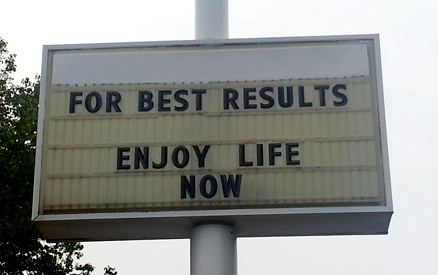 Launch into any money-related conversation and you’ll inevitably hear the following bad financial advice:
Launch into any money-related conversation and you’ll inevitably hear the following bad financial advice:
“But it worked for me!”
Those insidious five little words have been used to justify all types of terrible ideas, from buying lottery tickets to over-leveraging your investments to investing every last dime into Apple stock.
Let’s try this one on for size:
Common Sense: “Even if you find an awesome investment, spread your risk by picking a few other investments, as well. Rental properties are awesome, but even if you could make 20 percent cap rates, you should still keep a solid chunk of money in stock market index funds.”
Retort: “But I put 150 percent of my savings in gold in the year 2007 and it totally worked for me. Put every dime in gold! Nothing else! Why bother diversifying when you get the best returns in this arena?!”
Common Sense: “Hold on, you invested 150 percent of your savings?”
Retort: “Yeah, I can take a cash advance from my credit card at 14.9 percent and invest it for 170 percent gold returns! I’d be stupid NOT to!”
Common Sense: “Uh, don’t you think that’s a bit risky?”
Retort: “Hey scardey-cat, if you’re so terrified of risk, why don’t you sew your money into a mattress and leave REAL investing for us tough guys?”
Uh-huh. Right.
Tip: When your opponent has to justify their investing strategy with ad hominem attacks, they’re grasping for straws.
Alright, that was an easy example. Afford Anything readers are an intelligent group. I don’t need to explain this example. You can see why it’s an insane argument.
But let’s look at a subtler example of the “it worked for me” phenomenon. Let’s check out an example in which the counter is uncommon sense.
“But I Sold my Home for $20,000 More Than I Paid!”
UnCommon Sense: “Don’t tie up a huge chunk of your net worth in your home. Your home is NOT an income-producing asset. It won’t stick cash in your pocket each month.
“Your money should make money. So live in a cheap home while you deploy your cash into rental properties, stock index funds or other income-producing investments. Reinvest. Lather, rinse, repeat.
“Better yet, buy a small apartment building (like a duplex, triplex, 4-plex) as your first home. Live in one unit and rent out the others. If your neighborhood doesn’t have multi-units, live with roommates until you either have a baby or your mortgage is paid off.”
Retort: “But I sold my home for $20,000 more than I paid for it! So my house IS an investment! It worked for me!”
This is precisely the type of argument you’ll hear from someone who hasn’t crunched the numbers. The people who say it often conflate gross gains with net gains.
The average person doesn’t make very strong net gains on their home value, after adjusting for insurance, taxes, loan interest, repairs, maintenance, Realtor commissions and closing costs. If they’re lucky, most of their net gains can be explained as “inflation plus 2 percent.”
Most people would be better off living in tight quarters and putting the excess money into stocks.
Are there exceptions? Sure. Just ask the people who bought houses in Southern California in the 1970s. But this is the tail end of the bell curve. People have also made millions winning the lottery.
Furthermore, most of the people who happened to buy in 1970’s Southern California shot themselves in the foot by “trading up” continually until the market burst. Many people thought they were different, that they were the exception to the rule, but then they became scared that they’d be “priced out in five years.” So they bought a big home, then lost all their gains.
The best antidote to getting “priced out in five years” isn’t to pay an overinflated price today. It’s to create more wealth. Build your net worth at a rate that’s faster than housing growth. It’s not that tough.
Let’s try another example.
College is Good, Grad School is Better
UnCommon Sense: “You’re not a zombie. So don’t blindly repeat the mantra that college is good and graduate school is better.
“If you want to be a neurologist, awesome. Take out a six-figure student loan to go to medical school, because you’ll have a rare, high-demand skill that will command you a $225,000+ income.
“But if you want to be a social worker earning $30,000 a year with a master’s degree, think twice before burying yourself with debt.”
Retort: “But I did it and it wasn’t so bad! My student loan payments are only $180 a month. That’s nothing. That’s less than my car payment! And I think the government will forgive my loan in 20 years, anyway.
Plus, I got this job that pays $42,000 a year, and there’s a chance I could get enough in bonuses to make as much as $50,000. There’s no way I could have gotten that without my master’s degree.”
Ouch. This is one of the most common “it worked for me” arguments that I hear. And what’s befuddling is that the underlying message is that it really didn’t work.
$180 per month for 20 years is $43,200. That’s a decent chunk of cash, but it’s not horrifying. People have lost more by buying a house at the wrong price.
What’s worse is the missed opportunity. $180 invested monthly over 20 years is $106,730. That’s a horrifying amount.
But that’s still not the worst part. The real sad news comes from other missed opportunities. Want to start your own business after a few years? Good luck! The rest of us can move into grandma’s basement, mow lawns on the weekends to pay for groceries, and spend the rest of the week building our own graphic design enterprise. Your extra $180 monthly loan payment means you’ll need to mow many more lawns.
“That’s true of a mortgage, too.”
Yes, but you can sell a house.
That’s not the only hang up. You’ll be far less inclined to change careers if you decide your current path isn’t fulfilling. What would you do – go back for a second master’s degree in a different field, racking up even more debt?
You’ll have a rougher time quitting your job to travel the globe. You’ll lose the flexibility to change jobs and take risks. You’ll probably delay buying your first rental property or maxing out your Roth IRA by a few years.
“It worked for me” isn’t always the best path. At best, it’s an isolated data point. At worst, it’s bad advice.
